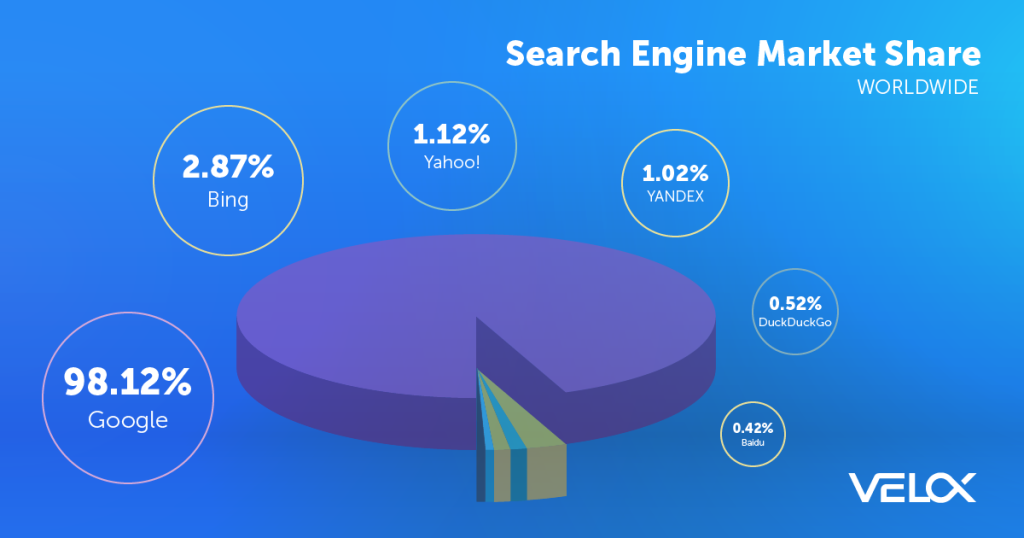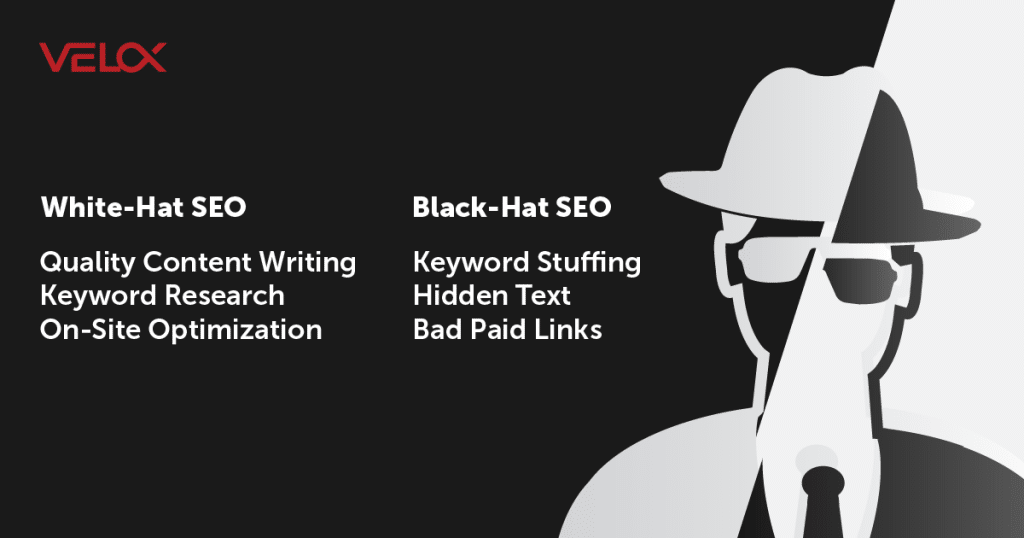
April 13, 2023
Is SEO Dead in 2023?
ROI is crucial to the success of any digital campaign, including SEO.
But with the rise of zero-click searches, Google’s frequent algorithm updates, and shrinking real estate of SERPs, marketers wonder if SEO is still a worthy investment in 2023.
If you’ve noticed fluctuating organic search impressions and site traffic, you wouldn’t be mistaken to think PPC is a better bang for your buck.
After all, why would you expect an SEO strategy to benefit your ROI when the leading search engine has placed an artificial ceiling on your ranking ability in the first place?
But don’t get out your “jump to conclusions” mat just yet. We’re going to dive into the data and trends that tell the real story of SEO in 2023 and why it’s still a worthwhile investment, no matter the size of your business or your target market.
Google Is Still the Most Visited Website
We all wish it was our own, but Google is the most visited website. On average, Google garners some 89.3 billion visits every month.
From Search to YouTube, Gmail, and even Google Slides, people all over the world depend on Google and its various products.
Some might think Google has gotten too big, warranting a renewed focus on antitrust laws, but we’ll leave that debate for another time. There’s no denying Google is massive, and it’s not going anywhere anytime soon.

As of early 2022, Google enjoyed 91.9% of the search engine market share. Regardless of how you feel about that number, it’s one that digital marketers can’t afford to ignore.
Here’s another one: Google processes around 8.5 billion searches daily. For those billions of searchers, the SERP experience is far more valuable than it once was—and that’s why some marketers have concluded that SEO is on its way out.
When you’re looking for a weeknight recipe, a quicker route to the mall, or a store where you can grab a last-minute anniversary gift, SERPs make it easier than ever to get the instant answers you’re looking for.
But that means it’s more difficult for site owners to push their pages into those coveted top results—especially with so much space dedicated to paid ads, rich results, answer boxes, and other elements.
That’s why, above all else, an informed, strategic link building campaign should be at the center of every SEO endeavor. There are some aspects of SEO that can help you realize a near-term boost, but there’s no substitute for an intelligent, targeted link building approach. It’s simply the most effective and enduring piece of successful SEO.
And when it comes to link building, don’t take the term “intelligent” to include AI. To be sure, recent growth in AI capability is impressive and increasingly practical. AI is likely to bring significant changes to search and digital marketing—we’ll discuss this further in the next section.
But as far as link building is concerned, it’s not a process that should be automated. Productive, efficient link building requires high-quality content and intelligent syndication. These two elements are required for an ROI-focused link building campaign that produces results—there’s just no getting around it, even with AI.
Link building is the process at the heart of every effective SEO campaign. It’s absolutely essential, so accept no compromises here as you pursue SEO to spur your brand forward.
AI Has Entered the Chat
You can use many words to describe Google, but “static” isn’t one of them.
Digital companies, including heavyweights like Alphabet, Google’s parent company, exist in an adapt-or-die environment.
Nobody bats 1.000, but Google’s adaptations have overwhelmingly improved the search engine’s utility for its end users.
However, keeping up with these changes can be frustrating for many brands, yet it’s absolutely vital if you want your SEO strategy to deliver results.
If you thought there’d been a few rough patches over the years, you’d better buckle up because the most recent and impending changes to the world of search are anything but minor tweaks.
The introduction of generative AI tools like ChatGPT and Google’s Bard is set to mark a significant disruption for search, similar to how digital media fundamentally altered the ways journalism is published and consumed.
In fact, the search-seek-find approach at the core of how we use search engines could be substantially eroded by the outputs of AI software.
This conclusion isn’t merely supported by the quantifiable potential of AI-powered search tools.
Yes, it’s true that although these tools are still in development, their capabilities are astonishing and continue to make waves. This tangible promise is a prime indicator of how they could reshape the way we search.
But it’s not the only reason a digital transfiguration seems likely.
Dramatic AI Investments by Search Heavyweights
You don’t need a background in forensic accounting to follow the money surrounding the development of AI-powered search.
Microsoft announced in January that they would extend their partnership with OpenAI, the outfit behind ChatGPT. While Microsoft didn’t confirm a figure, it’s been reported that their investment into OpenAI totals some $10 billion.
Even for the world’s largest software maker, a sum of that size shows real commitment—a clear sign that Microsoft is convinced AI will mark the next defining disruption in the digital space.
Google hasn’t exactly been the first out of the gate in the AI/chatbot race, but they’re in a dead sprint to develop Bard and roll it out to millions of users.
The haste of this pursuit hasn’t been without consequences. When Bard gave a widely publicized incorrect answer, Alphabet saw its market value fall by $100 billion in a single day.
More recently, over 1,100 people—including the likes of Steve Wozniak and Elon Musk—signed an open letter calling for a 6-month pause on AI development. The move comes as GPT-4 has proven the breadth of its capability, from writing malware to passing the bar exam.
In the letter, the group alluded to concerns about the potential impacts AI could have on search and society as a whole.
Regardless of the timeline, AI’s impact on search and SEO seems inevitable. But what exactly will it look like?
Will SERPs Survive AI?
As mentioned above, the search-seek-find method has been the backbone of search engines from their inception. However, AI-powered chatbots, such as ChatGPT and Bard, promise to deliver instant answers without all the clicking and scrolling. This streamlined search process could become far more efficient, delivering more value to the end user.
For digital marketers, this is the key point: All that clicking and scrolling is essential to measuring the health of sites and apps and the effectiveness of an SEO campaign.
For content-centric sites, including local news publishers, that traffic is absolutely vital.
If chatbots and AI-driven search take over, people no longer need to visit your site to benefit from your content—so why would you even bother with SEO?
At this point, it’s all hypothetical. Bottom line: the future of AI as it relates to search, despite strengthening trends, remains to be seen.
But here’s something indisputable: Google’s SERPs are more crowded than ever.
We’re not talking about growing competition in a given industry, either. Google’s SERP experience has grown more dynamic, with more visual content to help you find what you’re looking for in less time, plus precious PPC space reserved at the top.
Often, the true top-ranked result—not part of a product carousel or a sponsored link—isn’t even visible without scrolling. How’s that for ROI on your SEO strategy?
So if the imminent proliferation of AI throughout the search landscape has you feeling bearish about the future of SEO, know this: While the specific mechanisms may be different, much of what has site owners apprehensive about AI in search has already come to pass.
Even Without AI, Instant Answers Already Impact CTR
Through greater incorporation of rich results, including images, carousels, and featured snippets, Google has already changed how we search.
It’s easier than ever for end users to discover new information, locations, and products, all without having to click a link in search results.
Instead, Google works to deliver immediate answers directly in SERPs.
Here’s an example: Suppose you’re trying to find the nearest sandwich shop in an unfamiliar city. You can enter your query in the search bar, quickly scan the top-listed establishments and the Google Maps screenshot featured on the page, find one that looks appealing to you, and exit the browser. This is an incredibly useful and efficient way to find the information you’re seeking without having to click around to a bunch of different sites.
However, as useful as this is for searchers, local bloggers covering the top sandwich restaurants in their city might not be big fans of searchers finding the info they need without clicking through to their site.
The proportion of zero-click searches has risen sharply in recent years, almost entirely due to the way our search engine usage has evolved.
There are still plenty of us who go in-depth to find archived news stories or read long-form product reviews, but this group’s growth is far outpaced by the increase in searchers who rely on Google for quick results while on the go.
Depending on whose numbers you trust, about half of all searches result in zero clicks, with mobile search being the greater contributor.
Much to the chagrin of marketers everywhere, Google continues to prioritize the needs of users over site owners. However, if Google surfaces are increasingly geared toward UX at the cost of CTR, why would site owners expect to see meaningful ROI from their SEO campaigns?
The good old days of the 10 blue links are gone, thanks to Google search continuous scroll. But if you think SEO’s strength went with them, think again.
Though that does beg the question: Why does it seem like Google is actively working to make long-standing SEO strategies obsolete?
Prioritizing Discovery Over Commerce
All of these changes make it clear Google is more focused on user discovery over commerce.
By using artificial intelligence that wisely leverages rich results, Google is deliberately reinventing itself as a discovery engine.
The December 2022 Google Helpful Content Update means prioritizing the delivery of the right information over surfacing ads.
By no means are the folks at Google letting commerce fall by the wayside. In fact, that couldn’t be further from the truth. Just look at how they’ve upgraded Google Lens and all the AI-powered solutions to make Google Analytics 4 data more valuable than ever while also ensuring compliance with new privacy regulations like GDPR and the CCPA.
But the search engine must walk a fine line.
Users simply aren’t interested in a search experience that’s cluttered or clumsy. And that takes us to what is arguably Google’s greatest strength: its ability to evaluate search intent.
Google has transitioned from throwing out a handful of links to content searchers might be looking for to instead delivering the information searchers are after in an accessible, digestible manner.
Over the course of 5 years, Google developed a synonym system that delivers the content you’re looking for despite minor linguistic differences between your search and the content you would find most valuable.
This synonym system makes a remarkable difference in over 30% of searches, and it’s just one language model that helps Google evaluate your query to the fullest extent possible.
By fusing the ability to recognize locally-oriented searches, queries looking for recent results as opposed to older data, and the format (images, recipes, etc.) you’d likely find most helpful, Google expertly assesses search intent to deliver relevant, high-quality, practical results.
That includes commerce results, by the way.
Google’s reorientation as a discovery engine doesn’t exclude quality products, especially if shopping is part of a user’s search intent. Just don’t expect your eCommerce shop to enjoy the same visibility and funnel effectiveness that it would on certain social platforms.
If you’re thinking that this robust, refined functionality would be a boon for site owners implementing informed SEO strategies that focus on creating quality user experiences, you’re right on the money.
Any brand publishing helpful, original, user-focused content—and doing the technical work to optimize their site—stands to benefit from Google’s ongoing (and likely ceaseless) transformation.
So, why are so many people claiming SEO is dead in 2023?
Who’s Floundering and Who’s Flourishing
Frankly, most of the racket you’ve heard about the death of SEO comes from people who’ve been doing it the wrong way.
They see SEO as a “hack” or nothing more than a series of tricks to manipulate Google into improving page rankings.
But that’s not how this works. That’s not how any of this works.
What’s the point in trying to make low-quality or unhelpful pages rank higher? These are typically the pages that see the highest bounce rates anyway. Even if these site owners manage to “trick” Google, they can’t trick a human searcher.
If your site exists to benefit you without providing any value to your users, what makes you think any of those users would convert?
Yes, of course, you need to rank as highly as possible in SERPs to acquire traffic and gain new users. But don’t miss the forest for the trees—the whole point of SEO is to increase conversions, blow past your KPI goals, and build long-term brand loyalty.
Cloaking, deceptive redirects, publishing thin content, and keyword stuffing used to be relatively effective means of snatching better rankings for a moment, but they do nothing to improve your site or benefit your users. That’s one reason Google began working to combat them in the first place.
In the old days, maybe there was a benefit to employing “black hat” SEO techniques. But search engines caught on a long, long time ago, and in 2023, practices that go against search engine guidelines are far more likely to get you penalized than yield the results you need to grow your business.

You’d be upset, too, if Mom and Dad cut up your credit cards or yanked your driver’s license. That’s how many black hat folks feel these days, and it’s no wonder they’re making spurious claims about SEO’s deathbed.
But any surprise on their part is unjustified. Google’s updates and revisions don’t constitute some abrupt course reversal. And, especially of late, Google’s published guidance on best SEO practices is both abundant and clear.
Not to shock you, but the most effective way to improve your page rankings and see Google Analytics 4 data that will make you smile is to simply follow Google’s straightforward guidelines.
It might sound vanilla, but the plain truth is that Google rewards sites and apps that create genuine value for their users.
To succeed, you need original, user-focused content (remember the Helpful Content Update?) coupled with solid on-page SEO to resolve and avoid technical issues such as long loading times.
In truth, SEO is more valuable than ever. Thanks to algorithm updates along with deeper advice from Google, it’s never been simpler to follow white hat SEO practices and achieve stellar results.
Where Does That Leave SEO in 2023?
Anyone just beginning to dabble in SEO could understandably find the dynamism of this industry intimidating. But digital marketers who’ve been around for a few algorithm updates will tell you that this state of change is constant—it’s foundational to our medium.
Focusing on white hat SEO techniques is critical to achieving the visibility your business needs to grow its user base.
There’s about a 180-degree difference between this new reality and saying, “SEO is dead.”
It would be far more accurate to say SEO is different in 2023, but that’s because Google Search keeps working to become its best self for the benefit of everyone.
While there are plenty of old SEO practices to abandon, there are also plenty of new tools and approaches that can help you thrive as Google keeps growing up.
But be judicious, and keep these best practices in mind.
2023 SEO Best Practices
- AI can’t do everything. At least, not yet. That’s why your site should feature content created by humans, for humans. If you’re dead-set on using AI to speed up content creation, at least have a human fact-check and edit it before publication.
- Your content should be informative, educational, and, most of all, helpful. Check out our guide on Google’s December 2022 Helpful Content Update if you need additional context to understand why this is crucial.
- eCommerce businesses should consider selling through content. At the very least, ensure your product pages aren’t thin. They should include relevant, helpful details for your customers.
- With the rise of smart speakers, people are increasingly searching using their voice. Make sure your site is optimized for voice search in 2023.
- If you have a link-building campaign already underway, keep at it. If you haven’t considered link building but want to take your digital footprint to the next level, there’s no better time to get started.
There are plenty of other SEO practices to follow to make gains in 2023 but these are the big ones.
SEO is far from dead, and a data-driven SEO strategy is one of the best investments digital marketers can make to crush KPIs and achieve tangible, long-term results.
VELOX Media Can Help Boost Your SEO ROI
Google keeps delivering new ways to search, and AI has entered the chat, but there’s no substitute for expert research and a tailored digital strategy to drive your organic growth.
As a Google Premier Partner, VELOX stays ahead of the curve. Our team of SEO experts is ready to help grow your brand through an elevated keyword strategy, quality link-building, and world-class content.
For SEO as it should be, contact VELOX and get an enterprise SEO audit today.